Ch5-1(exercise)
英—9暑—01—词汇ability_along—名词—阅读A篇(专题1 事实信息理解题
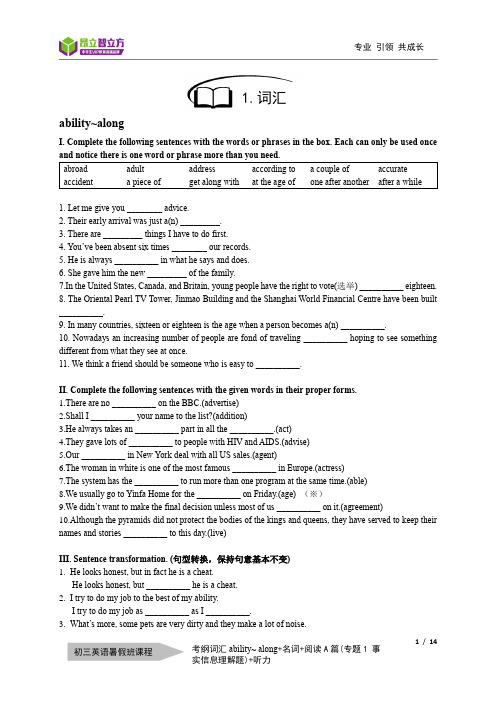
1.词汇ability~alongI. Complete the following sentences with the words or phrases in the box. Each can only be used once and notice there is one word or phrase more than you need.abroad adult address according to a couple of accurate accident a piece of get along with at the age of one after another after a while1. Let me give you ________ advice.2. Their early arrival was just a(n) _________.3. There are _________ things I have to do first.4. You’ve been absent six times ________ our records.5. He is always __________ in what he says and does.6. She gave him the new _________ of the family.7.In the United States, Canada, and Britain, young people have the right to vote(选举) __________ eighteen.8. The Oriental Pearl TV Tower, Jinmao Building and the Shanghai World Financial Centre have been built __________.9. In many countries, sixteen or eighteen is the age when a person becomes a(n) __________.10. Nowadays an increasing number of people are fond of traveling __________ hoping to see something different from what they see at once.11. We think a friend should be someone who is easy to __________.II. Complete the following sentences with the given words in their proper forms.1.There are no __________ on the BBC.(advertise)2.Shall I __________ your name to the list?(addition)3.He always takes an __________ part in all the __________.(act)4.They gave lots of __________ to people with HIV and AIDS.(advise)5.Our __________ in New York deal with all US sales.(agent)6.The woman in white is one of the most famous __________ in Europe.(actress)7.The system has the __________ to run more than one program at the same time.(able)8.We usually go to Yinfa Home for the __________ on Friday.(age) (※)9.We didn’t want to make the final decision unless most of us __________ on it.(agreement)10.Although the pyramids did not protect the bodies of the kings and queens, they have served to keep their names and stories __________ to this day.(live)III. Sentence transformation. (句型转换,保持句意基本不变)1.He looks honest, but in fact he is a cheat.He looks honest, but __________ he is a cheat.2.I try to do my job to the best of my ability.I try to do my job as __________ as I __________.3.What’s more, some pets are very dirty and they make a lot of noise.__________ __________, some pets are very dirty and they make a lot of noise.4.I have the same opinion as you.I __________ __________ you.I __________ __________ __________ __________ with you. (※)IV. Complete the following sentences with proper words. The first letter of each word has been given.1.This machine only a__________ coins.2.My father used to travel by a__________ a great deal when he was young.3.They are the people who can a__________ help you.4.One in seven a__________ is caused by sleepy drivers.5.Our kindergarten cannot accept children a__________ the age of 10.6.The letter was correctly a__________, but delivered to the wrong house. (※)7.One of the many a__________ of living in Shanghai is that you can eat out at almost any time of day.8.Today deaf people are a__________ to use a special display telephone to communicate.9.I got a ladder(梯子) from the shed in the garden, and put it a__________ the wall.V. Complete the following sentences according to the Chinese given. (根据提示完成下列句子。
五年级下册英语单词表1到6单元

五年级下册英语单词表1到6单元人教版五年级下册英语单词表(1 - 6单元)Unit 1.1. eat breakfast [iːt ˈbrekfəst]:动词短语,吃早饭。
2. have…class [hæv klɑːs]:动词短语,上……课。
3. play sports [pleɪ spɔːts]:动词短语,进行体育运动。
4. exercise [ˈeksəsaɪz]:名词,活动;运动;(这里也可作动词,锻炼)5. do morning exercises [duːˈmɔːnɪŋˈeksəsaɪzɪz]:动词短语,做早操。
6. eat dinner [iːt ˈdɪnə(r)]:动词短语,吃晚饭。
7. clean my room [kliːn maɪ ruːm]:动词短语,打扫我的房间。
8. go for a walk [ɡəʊ fɔː(r) ə wɔːk]:动词短语,散步。
9. go shopping [ɡəʊˈʃɒpɪŋ]:动词短语,去买东西;购物。
10. take [teɪk]:动词,学习;上(课)11. dancing class [ˈdɑːnsɪŋ klɑːs]:名词短语,舞蹈课。
12. when [wen]:副词,什么时候;何时。
13. after [ˈɑːftə(r)]:介词,在(时间)后。
14. start [stɑːt]:动词,开始。
15. usually [ˈjuːʒuəli]:副词,通常地;惯常地。
16. Spain [speɪn]:名词,西班牙。
17. late [leɪt]:形容词,晚;迟。
18. a.m. [ˌeɪˈem]:上午。
19. p.m. [ˌpiːˈem]:下午。
20. why [waɪ]:副词,为什么?21. shop [ʃɒp]:动词,购物;名词,商店。
22. work [wɜːk]:动词,工作;名词,工作。
Unit 2.1. spring [sprɪŋ]:名词,春天。
exercise
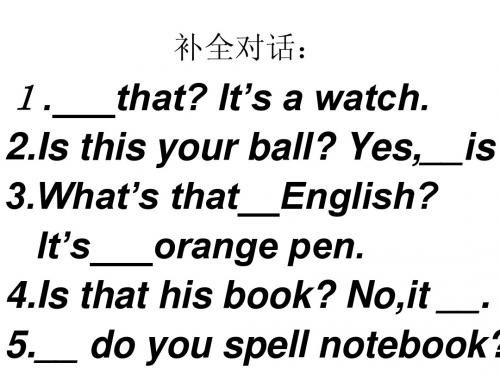
n_n_ i e
t_l_ph_ne f_ _st ee o ir
u be i _l a _nsw_r n_m_ _r g_ r e i f_m_l_ th_e_ q_est_on a i y r e u cl_c_ _ _ght s_v_n o k ei e e
f_ u l_st tw_ c_rd b_y o a o _r a o
Unit 2 What’s this in English?
• Ii Jj Kk Ll Mm Nn Oo Pp Qq Rr
•jacket ruler map •orange quilt key pen
•What’s this in English? •It’s a … . •What’s it in English? •It’s a /an … .
4.orange,likes,for,bananas Tom eggs and breakfast –5.Do they have a bat? • ___Mike___a bat? • 5.he,like,does,hamburgers • 6.Where is my key?变复数 • 7.Do they have tomatoes? • 变单数
3.Do you have a great sports c____? 4.Jim p___sports every day. 5.Do you like computer games? Yes,I think they are i____. 6.I have three pens,But I want some m___.7.She d___like volleyball,but she
r_ o o _m n_ e e _d
b_tw_ e e e _n e d_sk s_m_ al_ _m s_f_ o e ar oa
中级微观经济学_Ch5

16
5.2 Solutions to the Consumer’s Problem: Demand Function
The optimal choice is called the consumer’s ORDINARY DEMAND (一般需求)at the given prices and income. Ordinary demand function are denoted by x1*(p1,p2,m) and x2*(p1,p2,m).
18
Example 2: Quasi-linear Utility Function
Suppose a consumer has quasi-linear utility function: u(x1,x2)=aln x1+x2, a>0. The prices of x1 and x2 are p1 and p2, respectively, and consumer’s income is denoted by m. Also, x1 and x2 are nonnegative. What is the optimal consumptionnditions simultaneously you can get the interior solutions.
11
Solving for Interior Solution (method 2)
The conditions may be obtained by using the Lagrangian multiplier method, i.e., constrained optimization in calculus. How to do it? see supplement.
Unit2Howoftendoyouexercise?(1)PPT课件(人教版英语八年级上册)
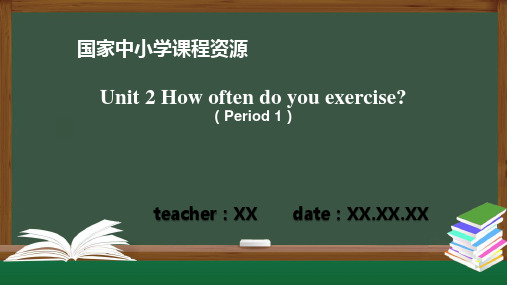
go to the movies
watch TV
Others
do the dishes
help with housework
walk the dog
初中英语
visit grandparents
play with younger brother/sister
be a volunteer
初中英语
Can you remember well?
初中英语
1c. Practice the conversation in the picture above.
watch TV
A: What do you do on weekends? B: I usually watch TV. A: Do you go shopping? B: No, I never go shopping.
国家中小学课程资源
Unit 2 How often do you exercise?
(Period 1)
teacher:XX date:XX.XX.XX
初中英语
Learning Aims 学习目标
At the end of the class, you will be able to 1. name different kinds of free time activities by illustrations; 2. use adverbs of frequency to talk about how often one does
Sports
play ball games
exercise
go swimming
初中英语
go running
go for a walk
英语新北师大版(2019)选择性必修第一册 UNIT 3 Period1TopicTalk
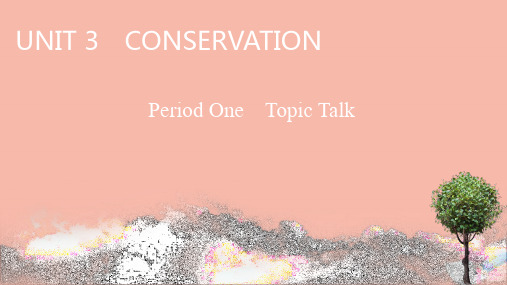
【语言提升】 switch to切换到,变成 To keep fit, you can switch to morning or lunchtime exercise. 为了保持健康,你可以转变到早上或午间锻炼。 Please switch to the news channel. I’d like to watch the news program. 请转换到新闻频道。我想看看新闻。
【针对练习】 单句语法填空 (1)Please ________ the radio to listen to news and the weather forecast. (2)Be sure to ________ the light when you leave the office.
(3)We’d better take the train into the city center, then a bus, ________ the tram(有轨电车), then maybe a taxi.
My uncle hasn’t been able to quit smoking, but at least he has cut down.
我叔叔还未能戒烟,但至少他已经少抽了。 We need to cut the article down to 1,000 words. 我们得把这篇文章压缩到1 000词。
【针对练习】 单句语法填空 (1)Wildlife has been greatly ________(threat) in the modern age. (2)Our neighbor threatened ________(call) the police if we didn’t stop the noise.
(完整word版)苏教版五年级下册英语Unit1知识点整理(2)
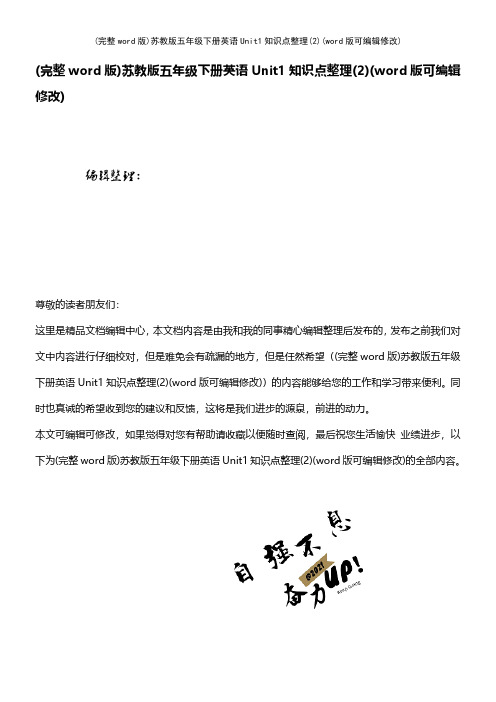
(完整word版)苏教版五年级下册英语Unit1知识点整理(2)(word版可编辑修改)编辑整理:尊敬的读者朋友们:这里是精品文档编辑中心,本文档内容是由我和我的同事精心编辑整理后发布的,发布之前我们对文中内容进行仔细校对,但是难免会有疏漏的地方,但是任然希望((完整word版)苏教版五年级下册英语Unit1知识点整理(2)(word版可编辑修改))的内容能够给您的工作和学习带来便利。
同时也真诚的希望收到您的建议和反馈,这将是我们进步的源泉,前进的动力。
本文可编辑可修改,如果觉得对您有帮助请收藏以便随时查阅,最后祝您生活愉快业绩进步,以下为(完整word版)苏教版五年级下册英语Unit1知识点整理(2)(word版可编辑修改)的全部内容。
苏教版五年级下册英语Unit1知识点整理(译林版)【词汇】1. prince 王子 2。
fairy 仙女3. why 为什么 4。
because 因为5。
clothes 衣服 6。
let 让7。
put on 穿上 8. before 在.。
..。
以前9。
have to 不得不,必须 10. try on 试穿11。
fit 合适,合身 12. take off 脱下13. mushroom 蘑菇 14。
late 迟的,晚的15。
pick 摘,拾 16. understand 明白,理解17。
be bad for 有害的 18. leave 。
..behind留下,丢下【词组或短语】1。
at the prince’s house 在王子的宫殿 2. come and help me 过来帮我3。
my gloves 我的手套 4。
so sad 如此伤心5。
put on the new clothes and shoes 穿上新衣服和鞋子6. come back 回来 7。
before 12o'clock 在12点前8。
have a good time 玩得开心 9. at the party 在派对上10. have to go 不得不走 11. visit every house 拜访每一间屋子12。
(高级)值班水手英语(1)精品PPT课件

New words and 1. 舵(e舵x令p)re2s.s舵i工ons3.重复,复述 4. 报告
5. 执行,完成 6. 过程,航向 7. 度数 8. 把定 9.轮,舵轮 10.船中部,正舵 11.换班,解除 12.注视,值班 13.苏伊士运河(埃及东北部) 14.紧张的,胆怯的 15.烦恼,担心 16.驾驶,掌舵 17.清楚地,清晰地 18.响亮地,大声地 19.浮标,浮筒 20.海峡,航道 21.灯塔 22.跟随 23.在前,向前 24.舵 25.完成,结束 26.准备行动 27.船长 28.在船尾,向船尾 29.驾驶台 30.港口,左舷 31.右舷
中华人民共和国海船船员适任考试培训教材武汉交通职业学院目录contentschapterdailyenglishchaptershipsorderschapterkeepingwatchgangwaychapterclosinghatcheschapteradjustingderrickschaptercargohandingopeartionscontentschapterdisembarkingpilotschapterdeckequipmentriggingsfittingchaptershipboardmaintenancerepairchapter10shipboardsafenavigationalwatchchapter11shipsecuritychapter12firefightingintroductioniiusefulexpressionsnewwordsexpressionexercise内容框架dailyenglishgreetinghowboard船上生活如何whatnew有什么新鲜事disembarkgangwayab一水abilityseamanshowaround参观farewall告别辞行sayinggoodbyeafterdinnerwonderfulmeal美妙晚餐catching赶上takecare照顾小心thanks感谢helpingeachother彼此帮助parcel包裹assistanceonboard船上帮忙steelmeshmaindeck主甲板apologyworkoversleep睡过头tool打破工具bosun水手长soundingtapedustbin垃圾桶praisesofficecharming令人着迷的adorable令人喜爱的passingpscinspectionpscportstatecontrol港口国控制paintingwork油漆工作poopdeck尾楼甲板alldeckhand所有甲板人员deserve值得introductionlittlehomesick有点儿想家coffeetimechattingsingle单身bigcontainership大的集装箱船trymybest经我的能力timesdatesaskingtimeadvancingshipsclock向前提前拨钟retardingshipsclock向后推迟拨钟ho
Unit 5 Language points 课件-高中英语人教版(2019)选择性必修第一册
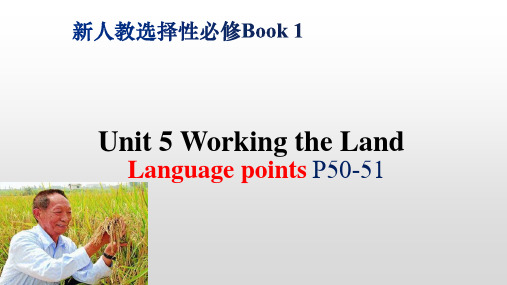
词汇精讲 句型剖析
课前•基础认知 课堂•重难突破
学以致用 单句语法填空 (1)She gives the impression of being generous,but in reality (real) she is a very selfish girl. (2)I didn’t realise (real) that you were not happy.
词汇精讲 句型剖析
课前•基础认知 课堂•重难突破
语境领悟 (1)Given his age,he is very strong and healthy. 考虑到他的年龄,他已经非常强壮健康了。 (2)Given that the students need more exercise,the head teacher has decided to add more PE classes. 考虑到学生们需要更多的锻炼,校长已决定增加更多体 育课。
vt.出产(作物);产生(收益、效益等) yield to sb/(doing) sth 屈服于某人/做某事 yield sth/sb up (to sb)放弃
课前•基础认知 课堂•重难突破
词汇精讲 句型剖析
学以致用 单句语法填空 (1)It’s polite to yield up your seat to an old lady on the
replace his old one. (3)There is a possibility of severe water shortages (short)
in the foreseeable future. (4) Shortly (short) after he left the bus station,came a
exercise 3

第3章化学热力学的初步概念与化学平衡一、要点1.化学热力学把热力学的理论、原理、规律以及研究方法,用之于研究化学现象就产生了化学热力学。
它可以解决化学反应中的能量问题、化学反应的方向问题,以及化学反应进行的程度问题。
2.系统与环境系统曾称体系,指化学直接研究的对象,与系统密切相关的部分或与系统相互影响所可及的部分称为环境。
两者之间可以交换物质或能量,据此可把系统分为:①敞开系统:系统和环境之间可以有能量和物质的交换;②封闭系统:系统和环境之间只有能量的交换,而不能有物质的交换;③孤立系统:系统和环境之间既无能量的交换,也无物质的交换。
3.状态和状态函数系统的所有客观性质的综合表现即为系统的状态。
描述系统状态的物理量称之为状态函数。
状态定,状态函数定,即有一定的值;状态变,状态函数的值变。
4.过程和途径系统的状态发生了任意的变化,就说系统发生了一个过程。
分别发生在等温条件下、压强一定条件下和绝热条件下的系统的变化,分别称为“等温过程”、“等压过程”和“绝热过程”。
系统由始态到终态的变化,可经由不同的方式完成,这不同方式即为“途径”。
5.热和功系统和环境间因温度差别引起能量交换,这种被传递的能量称为“热”,用符号Q表示。
并规定当系统吸热时,Q为正值,即Q > 0或ΔQ > 0,放热时Q为负值,即Q < 0或∆Q < 0。
除此之外,其他在系统和环境之间被传递的能量均叫做“功”,用符号W表示。
并规定当系统对环境做功时,W < 0,反之W > 0。
6.热化学研究物质化学和物理变化过程中热效应的学科叫做热化学。
即对于伴随着化学反应和状态的变化而发生的热的变化的测量、解释和分析。
7.热量计用来测量化学反应热效应的装置。
常用的有测量物质恒容燃烧能的弹式热量计,测量物质恒压反应热等热效应的各种微量热量计和测量物质热容的各种低温热量计。
8.热容指物体温度升高1K所需的热量,单位为J·K-1。
新标准大学英语视听说教程3 Units 1-10答案

New Standard College English (Book 3) Unit 1Inside ViewConversation 1Exercise 11 Janet is a Chinese student in England.2 She studies at the University of Oxford.3 She is in London.4 Probably she is visiting her friends or doing a tour around London.5 I can see Tower Bridge and the Houses of Parliament.6 She is talking to her friends.Exercise 21 Janet is not going back home to China. (Because she wants to work in London during the long summer holiday and find out what it’s lik e to live in this busy and lively city.)2 It is in the middle of summer.3 Janet is going to work for London Time Off, a website about London.4 Joe is Janet’s boss.5 Janet doesn’t know what she is going to do.(Because it is her first day working there.)6 Joe and Andy do not agree that New York is the greatest city. (Andy thinks London is.)Exercise 3Exercise 41 Janet wants to find out what the busy and lively city of London is like.2 Today.3 Joe doesn’t agree with Andy. (But they argue in a joking way.)4 It is not as great a city as London.5 She thinks London is probably the greatest city in the world.Conversation 2Exercise 55-6-2-3-8-7-4-1Exercise 61 don’t mind my asking2 He drives me crazy3 What do you mean by4 It’s the last thing5 we check out new events6 the musicians or the actors7 Can I ask you something else8 we’ve got an interview to do9 supposed to be on his wayEveryday English1 (b)2 (b)3 (b)4 (a)5 (a)6 (b)Outside ViewExercise 24-5-1-3-2Exercise 31 (b)2 (c)3 (c)4 (a)5 (a)Exercise 51 Bjoern (b), (d), (f)2 Wolfgang (a), (e)3 Pascal (g)4 Yosma (c)Exercise 61 So that they can learn something about themselves2 It can lead to a higher self-consciousness.3 It can lead to happiness.4 A strengthening of the personality.5 “Who am I as a person? Am I really happy?”6 He thinks students can get indications of happiness from teachers.7 Happiness scientists.8 They don’t write definitions on the board.Listening inExercise 21 (c)2 (d)3 (a)4 (b)Exercise 31 tolerant; rounded2 close to; stand up3 beauty; generosity4 an opportunity; beyond the one5 behaved; selfish6 pretend; see through7 arrived in; had to help8 difficult time; a huge amount ofExercise 61 Joan is an academic counselor at Manchester University.2 She is talking to a presenter and callers for a radio program.3 It is important, because their choices of subject are likely to have an impact on their future careers.4 He wants to work in IT.5 Not at all. (In Britain each university has a different mixture of courses; some courses can only be found in a few universities.)Exercise 71 strengths; weaknesses; personality; like; subjects; organized; confident; outgoing; a team; working alone2 future careers; into a particular area of work; chosen field; related industries; leading3 vocational; graduates; high-flyers; career; practical; transferable; recruitment Unit 2Inside ViewConversation 1Exercise 2The true statements are: 2, 3 and 5.1 Andy mentions the names of two bridges, not one.4 Andy saw it go up when he was a child.6 It is one of the cleanest city rivers today, although it was very polluted in the past.Exercise 31 In Southwark, which is part of London2 About 120 years old3 It used to be raised three or four times a day4 not so often5 In the late 1980s and 1990s6 In the 1960sExercise 41 She’s really impressed.2 Because they couldn’t go under London Bridge.3 Just on this side of London Bridge.4 He remembers that many buildings were damaged from the war.5 They used to take you to the hospital because the water was so polluted.6 It is one of the cleanest city rivers in the world.Conversation 2Exercise 61-(b) 2-(b) 3-(b) 4-(d) 5-(d) 6-(a)Exercise 71 The thing about2 It’s amazing3 Let me see4 Anyway where was I5 You were telling me about6 That’s fascinating7 Let me thinkEveryday English1-(b) 2-(a) 3-(b) 4-(b) 5-(b)Outside ViewExercise 24-3-6-1-5-2Exercise 31 where there is war2 go to school3 working in 157 countries4 has never known peace5 bringing medicine6 get an education7 40,000 kids8 girls were not allowed9 50 per cent10 the mystery about her for 12 yearsExercise 41 (d), (g)2 (e)3 (c)4 (f)5 (a)6 (b)Exercise 51 (d)2 (a)3 (b)4 (b)5 (a)Listening inExercise 21 her husband2 a church in the distance3 her favourite aunt (and uncle)4 a farm5 two (the speaker and her brother)6 about 147 20 yearsExercise 31 (c)2 (b)3 (a)4 (c)5 (d)6 (a)Exercise 63-5-1-4-6-2Exercise 7Exercise 81 Because he thought it would make him grown-up.2 Because he was lying on the floor screaming and screaming.3 Because she wanted to go home and she couldn’t get her coat on.4 Because they used to fight (but actually, they’re just having fun).5 Because she had short blond hair.6 Because she had had some good times.7 Because he wanted to get a job and earn money.Unit 3Inside ViewConversation 1Exercise 21. He used to work in a theatre.2. He moved the scenery between the acts in the play.3. She saw My Fair Lady.4. To find out where Andy and Janet are … or to check if they are going to be late.5. He’s a theatre critic.6. She has to check the sound level.Exercise 3Exercise 4True statements are 2, 3, 4 and 5.Conversation 2Exercise 61 (b)2 (c)3 (d)4 (c)5 (a)Exercise 71. has just been to see2 Can you tell me something about it3 Tell me more about4 It sounds very unusual5 So it’s family entertainment6 did I do something wrong7 Did you remember to8 Hurry upExercise 81-6bbaaaaOutside ViewExercise 2The true statements are: 1, 5, 7, 9 and 10.Exercise 31 the most famous2 broke all the rules3 looking directly at4 a sense of movement5 indicated a real place6 what is she trying to say7 covered up one side of her face8 we’re the subject9 seemed happier10 the mystery about her11 line up between12 tell a storyExercise 4Exercise 51 Her portraits and books both tell stories.2 The character or performer of the images.3 She is trying to capture a deeper essence of a person.4 He uses a pinhole camera which requires a very long exposure.5 She needs to work on the reflections in the water and the face of the boy.6 He links them together with a string.7 She tries to capture something about the soul, or essence, of the person.8 It represents the process of decay.Listening inExercise 21 The highlight was seeing the show Nanta.2 It’s a live show: part theatre, part dance, part music.3 The music is a mixture of traditional Korean music, percussion and drums.4 In 1997.5 Because it’s a non-verbal performance.6 It’s set in a kitchen.7 They use knives, dustbin lids and kitchen utensils.8 Nanta means “random drumming” in Korean.Exercise 3The true statements are: 2, 4 and 7.1 Nanta is a mixture of traditional Korean with a Western style performance.3 They are preparing food for a wedding reception.5 They give cooking lessons to the manager’s nephew, not to the manager.6 They are totally involved but they don’t throw food.8 They have already appearedat the Edinburgh Festival.Exercise 6Exercise 71 (a)2 (c)3 (d)4 (c)5 (b)Unit 4Inside viewExercise 21 They’re preparing to interview Janet’s friend.2 The interview is part of a background series to ethnicrestaurants.3 The London Video Games Festival in Trafalgar Square.4 It’s very popular. About 100,000 people attended last year.5 They put up a huge tent where people6 Because it’s very popular.Exercise 31-5 bdabbExercise 61 The rise of e-book readers.2 That you’ll never run ou t of things to read.3 He complains that someone is using a mobile phone and he is picking up the signal in the other studio.4 She feels that she keeps making a mess of things.5 A report on how technology is changing so fast.6 Because Joe started the recording before Andy had time to adjust the sound level. Exercise 71 They’re not really like2 But the trouble is3 the great thing about them is4 there is nothing quite like5 more text messages than6 it’s my fault7 Just ignore himOutside viewExercise 21-6 bcbcddExercise 31 wax and feathers2 got off the ground3 thrust, lift and control4 Thrust5 the tail6 provide lift, control and thrust, and be light enoughExercise 45-3-2-6Exercise 51 inventions2 develop and test3 helped them understand and study4 the shapes of different wings5 made the front steady6 controllable7 distance and duration8 1000 test flight9 flew the first powered airplaneListening inExercise 21 Work in office-based jobs.2 People are not exercising their bodies and they are putting on weight.3 It is caused by long periods spent sitting at the computer.4 They ensure staff are sitting correctly at their computers and take breaks.5 It is caused by several factors: lack of natural air and light, having a lot of electronic devices and air-conditioning.6 They are installing better lighting and ventilation,increasing the number of plants and encouragingemployees to take breaks.Exercise31 18 per cent2 over 40 per cent3 a/one fifth (20 per cent)4 over a million5 roughly 30 per centExercise 6The true statements are 2, 7 and 8Exercise 71 the amount of the world’s farmland that ismanaged intensively2 the proportion of flowering plants that need to be pollinated in order to bear fruit3 the number of commercially grown crops that need honey bees4 the number of bees released by farmers in California to pollinate almond trees5 the time for a species of wild mango to bear fruit6 the time for a cultivated species of mango to bear fruitUnit 5Inside ViewExercise 21. It is Cantonese food.2. Indian and Chinese restaurants.3. They want to know about life in Chinatown and a bit of background and history.4. There are very few who actually live there.5. It’s much smaller.6. There are only three or four streets.Exercise 31. (d)2. (g) 3 (f) 4 (a) 5 (b) 6 (c) 7 (e)Exercise 5□1 So where do you call home?☐ When did your family move to London?□3 And how did they make their living?☐ Did your grandparents work in Chinatown too?□2 So how long has there been a Chinese communityin London?□4 And why did Chinatown move over here?☐ Can most British-born Chinese speak Chinese?□5 And does it still feel like a traditional Chinesecommunity?☐ How do you celebrate Chinese New Year in London?☐ Which is the best Chinese restaurant in Chinatown?Exercise 61 (d)2 (b)3 (c)4 (b)5 (a)Exercise 7(1) I guess this is home(2) how long has there been(3) When the Chinese first came to(4) they were also famous for(5) At the start of the 20th century(6) from all over London(7) And does it still feel like(8) along with the ChineseEveryday EnglishExercise 81 (b)2 (b)3 (a)4 (b)5 (b)Outside ViewExercise 21. It’s peaceful and quiet and just the place to relax.2. They fight.3. During the mating season.4. When they’re on a crowded street or bus.5. She’d be very angry and tell them to move.6. Maybe throw a little sand in their face and make them move.7. Move his towel next to them and start a conversation.8. People can get a lot more aggressive.9. She’s waiting until someone wants her parking space. Exercise 31 (b)2 (c)3 (c)4 (d)5 (a)Exercise 51. He pulls into the parking space that the producer left.2. Because he was waiting first.3. Anger management counselling.4. Because the radio is on.5. A hearing problem.6. He would beep the horn, roll down the window and shout very rude things at the person who took the space.7. She would yell out of the window and tell them to move.8. It is important for survival.Exercise 67-1-4-8-2-9-13-3-10Listening InExercise 2•synergy: performance of effective groups > sum of individuals.•1930s Elt on Mayo discovered “Hawthorne effect”:* Being in a study improves productivity regardless of other factors.* Personal identity, self-esteem and social context in which group works improve performance.• 1960s Tuckman described stages of a group.* 1 Forming: Individuals get to know each other.* 2 Storming: Individuals share ideas and creative energy.* 3 Norming: Group identity forms.* 4 Performing: Group works together.Exercise 31 (c)2 (a)3 (e)4 (g)5 (f)6 (d)7 (h)8 (b)Exercise 61 (c)2 (b)3 (c)4 (c)5 (a)Exercise 71. Over 250 people died.2. 36 new homes were rebuilt.3. It is two square metres.4. 30 per cent of the cost of the building or rebuilding their home is needed.Unit 6Inside ViewExercise 21. She thinks it’s old.2. Wood.3. A thatched roof.4. A kind of dried grass.5. They stand.6. A report on the summer season at the Globe. (As schools have terms, theatres have seasons.)7. Stratford-upon-Avon.Exercise 31. 19972. 16663. There are some seats but most people stand.4. May.5. About 130 kilometers.Exercise 41 (d)2 (b)3 (c)4 (a)5 (c) Exercise 6The true statements are: 1, 3, 4, 5 and 9. Exercise 7(1) when was Shakespeare born(2) when did he die(3) when did he come to London(4) don’t know exactly(5) what happened to him later(6) I reckon there are about(7) What I think is(8) I suppose it’s because(9) I’m really stunned(10) I guessExercise 81 (b)2 (a)3 (a)4 (b)Outside ViewExercise 2The true statements are: 1, 2 and 5.Exercise 31 (b)2 (c)3 (a)4 (b)5 (d) Exercise 4(1) I don’t like cycling(2) do something good(3) sit on a couch(4) and with two legs(5) life on the road(6) throw the bike(7) It’s been d ifferent(8) performing marvellouslyListening InExercise 21. New York2. afternoon3. 1554. 30 to 45 seconds5. none6. 577. 29Exercise 31. there were few injuries2. catch fire3. made a successful landing4. taking in water5. helped into the boats6. were taken to hospitals7. as a hero8. without any enginesExercise 6Paul1. zoo keeper2. Al Gore3. making people take climate change seriously4. GreenpeaceClare5. mum, part-time accountant6. Melinda Gates7. co-founding the Bill and Melinda Gates Foundation8. Save the ChildrenExercise 7The true statements are: 1, 5 and 7.Unit 7Inside viewExercise 25-3-2-6-1-4Exercise 31 (c)2 (d)3 (d)4 (a)5 (b)6 (b) Exercise 51 It’s got everything to do w ith science.2 She thinks it sounds fascinating.3 At the museum4 She tells him Andy and she are going to spendthe night together.5 Joe is surprised and confused.Exercise 61 Why is it so special2 I suppose this is3 have special exhibitions for kids4 The first thing you have to do5 we’re really gonna stay the night6 While you’re getting7 where are you two off toExercise 71-5 bbbabOutside viewExercise 3Uses of computers include: to provide travel updates, to operate trains, to analyze evidence, to control buildings, to switch on lights, to provide entertainment, to control the temperature and to close blinds.Places where computers are used include: homes, police stations, libraries and schools.Exercise 41 (a)2 (d)3 (c)4 (a)5 (d)Exercise 51 areas of life2 in our homes3 computer-controlled houses4 adjust the temperature5 give new instructions6 react to match7 TV and Internet8 outside changes9 stop too much sun from entering10 turn the oven onListening inExercise 21 Scientists at the University of Bristol carried out a two-month study to find the best way to dunk a biscuit.2 About one in four biscuits break up when dunked.3 Unlike biscuits, doughnuts are held together by protein gluten which doesn’t break down in hot liquids.4 Horizontally dunking a biscuit into tea allows a longer dunking time, as the liquid takes longer to soak into it.5 The hotter the tea the faster the biscuit breaks up.6 Dunking a biscuit in a hot drink releases up to ten times more flavour than eating the biscuit dry.Exercise 31 dunking biscuits2 held together3 absorb liquid4 travel through5 hold the biscuit6 producing a tableExercise 6The statements said by Peter are: 1, 2, 4, 6 and 8.The statements said by Louise are: 3, 5 and 7.Exercise 71 (b)2 (b)3 (d)4 (a)5 (c)6 (a)Unit 8Inside ViewExercise 21. Most weekends.2. Every day of the week. / All week.3. 10 am to 6 pm.4. It gets pretty lively as people go to the pubs and restaurants all around.5. They sell pretty well everything.6. It’s a famous club. / It’s one of THE great clubs in London.7. To the Electric Ballroom.8. No, she doesn’t.Exercise 3The statements said by Janet are: 4 and 8.The statements said by Andy are : 3, 6 and 7.The statements said by Joe are: 1, 2 and 5.Exercise 51 (c)2 (c)3 (d)4 (d)5 (c) 6(b)Exercise 6(1) to be having fun in London(2) wearing these amazing costumes(3) attracts about two million people(4) It takes place(5) the usual time(6) It’s a festival which takes place(7) for the rest of the year(8) It starts in half an hourExercise 71 (a)2 (a)3 (b)4 (b)5 (b)Outside ViewExercise 21. The lunar calendar.2. Red means happiness.3. Flower arrangements which include pine branches, bamboo and blossoms.4. Oranges and tangerines mean happiness, coconuts represent togetherness and lychee nuts represent strong family ties.5. Noodles represent long life.Exercise 31. so the exact date2. lasts for 15 days3. to send out the old year4. for the coming year5. red envelopes of money6. cleaning the house completely7. flowers will turn into fruit8. A whole fish9. during this holidayExercise 41. they’re very generous2. South Korea3. a family setting4. get your own plate; dig in together5. Asian; Americans6. American kids7. what customs they like8. KoreaExercise 51 (c)2 (c)3 (a)4 (c)5 (c)6 (d)Listening InExercise 2The true statements are: 2, 5 and 6.Exercise 31. making a guy2. burn him3. start of the 17th century4. beneath Parliament5. he was trying to light6. which they did7. no reason8. started buildingExercise 71.Because it’s a religious festiv al but she is not a religious person and so it doesn’t have that kind of meaning to her.2. It’s a good reason for families to get together, eat a lot of good food and give each other presents.3. Because it’s exciting to think that Father Christmas wil l come down the chimney and leave them presents.4. It’s a time to give thanks for everything you have.5. He says it’s probably as commercialized as Christmas.6. The shortest day of the year.Unit 9Inside viewConversation 11. Example answers1. The three friends are standing by the bar in a pub, probably discussing what to order. The barman is possibly filling a glass or standing ready for their decision.2. Probably not. She may in fact be asking for advice as the situation is an unfamiliar one.3. I am a bit puzzled---- bars usually have more exciting names. The Duke of York sounds odd, but perhaps it is a very old pub.4. It could be something to do with history or perhaps such names are memorable and are good for business.2 AnswersThe true statements are: 2and 5.3. Answers1(b) 2(c) 3(d) 4(c) 5(d)4. Example answers1. They look attractive and are memorable, and also they come from a time when fewer people could read easily.2. They could get their names from the people the first owners liked or wanted to please, features of the building, or they could be references to the location.3. They illustrate the name.5. Answers5-places 2-animals1-royalty or landowners 7-myths and legends4- objects 6- jobs3-symbols taken from the Bible6. Answers(1) where was I (what was I saying before)(2) You sound as if you know something about(3) where did I leave off (finish speaking)(4) OK, got you(5) and let me see(let me think)(6) My mind’s g one blank (I cannot recall for a moment)(7) if you’ll excuse me(8) It was great talking to you7. Answers1(b) 2(a) 3(a) 4(a) 5(b) 6(b)Outside view1 Example answers1. It’s the British Royal Family. There’s the Queen and her husband. And look, aren’t these William and Harry? The main Royal Family starts fourth from the left with Prince William and his younger brother, Prince Harry. Slightly to the back, behind her mother, stands Princess Anne, the Princess Royal. The Queen stands next, waving. The lady in white is the countess of Wessex, with just in front of her, her husband, Prince Edward. He is looking over the shoulder of her father, Prince Philip, the Duke of Edinburgh. The tall gentleman in uniform is the Princess Royal’s husband, Rear Admiral Laurence. The Duchess of Cornwall in blue stands next to her husband, Prince Charles, Prince pf Wales.2. They are royal.3. Your Majesty, I think for the Queen, for the first exchange and after that Ma’am. For princes Your Highness and after that, sir.4. Well, they are normal human beings but they live in palaces.5. The jewels would be nice but all the ceremony must be dull and the lack of privacy cannot be nice as princess Diana knew so well.2. AnswersPhoto 1: ElizabethPhoto 2: JamesPhoto 3: GeorgePhoto 4: Victoria3. Answers1. It’s used to refer to princes and princesses.2. It’s used to refer to the Queen.3. The German sounding name used by the Royal Family before.4. Te Royal Family’s popular family castle.5. The Royal Family’s sur name after 1960.6. At the wedding, Charles was recorded in the marriage register as His Royal Highness Prince Charles Philip Arthur George, The Prince of Wales.7. Popular names for royals.4. Answers1(b) 2(b) 3(d) 4(a) 5(b) 6(c)Listening in2. answers2-6-5-3-1-43. Answers4. Answers1. attractive, powerful: attractive, powerful2. to think of3. much too long4. meaning very small5. the best or the strongest6. most romantic lovers7. sound luxurious6. Example answers1. It seems to be about how names sound in different languages and changing your name when you get married.2. Clare is a gir l’s name and men do not change their name on marriage so it’sa woman speaking.3. Greek.7. AnswersThe true statements are: 3, 4and 6.8. Answers1.(c)2. (b)3. (c)4. (a)5. (d)Unit 10Inside view1. Walking2. She doesn’t know anything about London.3. Some existed; some did not.4. To have come to London with his cat to seek his fortune.5. He was Lord Mayor of London four times.6. We have no proof that he had a cat.7. The ghosts of London.4. Example answers1. They all look very pleased so they must be praising her.2. I think all the interesting places they have seen must have been pleased her.3. Perhaps working with Andy.4. Yes, I think they have a special relationship.5. Answers1(b) 2(a) 3(b) 4(d) 5(c)6. Answers1. Way to go2. That’s the way to do it3. Let’s hear it4. Good for you5. Thank you so much for your help6. couldn’t have done it7. we certainly did8. It’s extraordinary9. So what’s next7. answers1(b) 2(a) 3(b) 4(b) 5(a)Outside view2. AnswersThe true statements are: 1,3and43. Answers1. in the present2. to trick people3. got sunscreen in his eyes4. eating bananas5. were descended from apes6. humans and animals4. Answers1. The Gravity reduction story and the Noah’s Ark sto ry.2. The Gravity reduction story.3. The Gravity reduction story was a hoax; the Noah’s Ark is true (because something has been spotted.)5. Answers1. is based on a famous hoax2. would pass in front of3. at that moment4. the world was destroyed by a flood5. It is believed to be6. announced on the radio7. snow on the top of8. may or may not be Noah’s Ark9. we want to believe themListening in2. Answers1(d) 2(a), (b),(c) 3(e), (f) 4(d) 5(c) 6(a) 7(e) 8(e)3. Answers1. the huge differences2. there was only darkness3. there was light4. a small island5. Mother Earth6. a bird7. the sun, and the earth8. creation myth at all6. AnswersCallers 1,3,4 and 5 believe in big cats.7. Answers1(b) 2(c) 3(d) 4(b) 5(d)。
有机化学 期中考试习题课
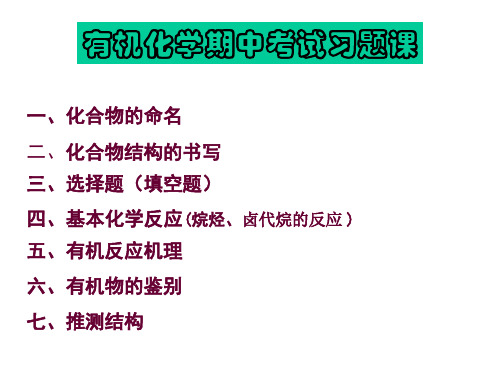
Exercise2:完成下列反应式:
+
Cl2 Cl+
HI
?
+
H2
?
H 2 / Ni 80℃
CH 2CH 2
三 卤 代 烷 的 反 应
Nu:
-
Nu: B:
-
RC C C RC R'Li
Nu
RC
X
[H] Li Mg
H CuI R''X R'2CuLi R' R''
-
R''X
R' R''
例 . 用化学方法鉴别:
Cl CH2CH3 CH2CH2Cl CHCH3
解析方法: (1)找出化合物的结构特点——三员环、双键、氯代烃 (2)鉴别官能团的特征反应——与溴的加成、KMnO4氧化 与AgNO3/醇的反应。 (3)首先分组鉴定,大组化成小组,再分别个别鉴定。
第七部分、推测结构
推测结构的方法:
)
β-苯基溴乙烷 c
D. a>c>b
3、下列化合物中有顺反异构体的是(
A. CH 3CH 2C=CH 2 CH 3 C. CH 3CH 2Ch=CBrCl
)
B. CH 3CH=CCl2 D. CH 3CH 2CH=C(CH 3)2
4、下列化合物中是S构型的是(
CH 3 HO H A D HO C 6H 5 H COOH B Cl CH 3 C C 6H 5
R'M gX
-
OH ,RO ,R (RM gX),RC C ,CN ,RS ,HS , I ,SCN ,RNH2 .R 2NH,R 3 N,RCOO ,NO3 ,ArH,....
2019-2020学年人教版新起点(一起)五年级英语第一学期全册知识点

人教新起点(一起)五年级上册Unit 1 知识汇总名词(忘记做(帮助某人做某事)五、常用表达Thank you.人教新起点(一起)五年级Unit 2 知识汇总eg: -Who is your favourite teacher?-My favourite teacher is Miss Zhao.3.询问某人外表句型:What does he/she look like? He/ She ....Eg:- What does your English look like? -She is short and beautiful, and she has long curly hair.人教新起点(一起)五年级上册Unit 3 知识汇总人教新起点(一起)五年级上册Unit 4 知识汇总人教新起点(一起)五年级上册Unit 5 知识汇总一、语音知识w onderfu1精彩的coo1酷的fantastic极好的cartoons动画片四、句型1.询问"某人最喜欢收看什么电视节目"的句型及其答语:-What are your favourite TV shows?-My favourite TVshows are+节目eg: -What are y our fa v ourite TV sho w s?-M y fa v ourite TV shows are sports shows.2.询问"某人何时收看某个电视节目"的句型及其答语:-When do you usually watch+节目?-I/We usually watch them+ 时间.eg: 1. -When do y ou usua11y watch news shows?-I usua11y watch them on Saturda y e v ening.2. -When do y ou usua11y watch music shows?-We usua11y watch them in the morning.人教新起点(一起)五年级上册Unit 6 知识汇总chore家务cleanthe r o o m打扫房间maketh e bed整理床铺takeou t therubbish倒垃圾wa s h c1oth e s洗衣服tidy t he d esk清理书桌sw e epth e f1o o r扫地cal1打电话给__三、句型1. --D oyouusua lly h e lpyourpar e ntsdo c hor e sath o m e?--Y e s.Ido.It a keoutther u b b ishandmak e mybed.2. -- What c hor e sdoyouusual l ydoath o me? (你经常在家做什么家务?)-- Iusua11ywash c1othes. (我通常洗衣服。
(广州版)小学五年级英语上册 单元测试
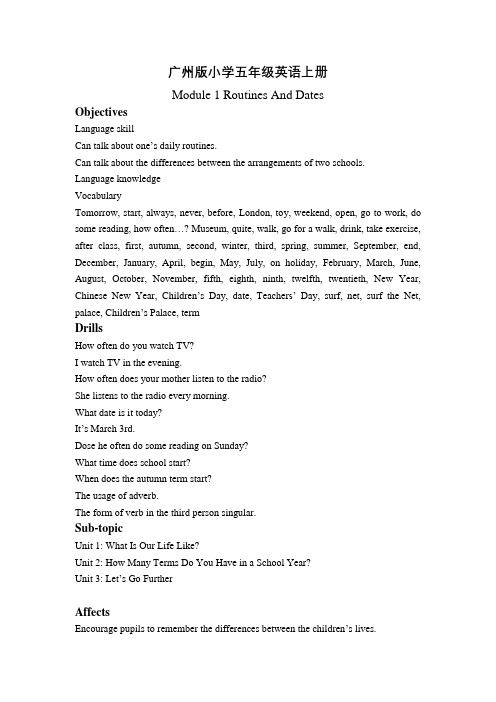
广州版小学五年级英语上册Module 1 Routines And DatesObjectivesLanguage skillCan talk about one’s daily routines.Can talk about the differences between the arrangements of two schools.Language knowledgeVocabularyTomorrow, start, always, never, before, London, toy, weekend, open, go to work, do some reading, how often…? Museum, quite, walk, go for a walk, drink, take exercise, after class, first, autumn, second, winter, third, spring, summer, September, end, December, January, April, begin, May, July, on holiday, February, March, June, August, October, November, fifth, eighth, ninth, twelfth, twentieth, New Year, Chinese New Year, Children’s Day, date, Teacher s’Day, surf, net, surf the Net, palace, Children’s Palace, termDrillsHow often do you watch TV?I watch TV in the evening.How often does your mother listen to the radio?She listens to the radio every morning.What date is it today?It’s March 3rd.Dose he often do some reading on Sunday?What time does school start?When does the autumn term start?The usage of adverb.The form of verb in the third person singular.Sub-topicUnit 1: What Is Our Life Like?Unit 2: How Many Terms Do You Have in a School Year?Unit 3: Let’s Go FurtherAffectsEncourage pupils to remember the differences between the children’s lives.To have fun.To increase pupils’ sense of rhythm.To encourage pupils to think.To challenge more able learners.Learning strategyCognitive strategy.Regulating strategy.Communicative resource strategy.Cultural ConsciousnessTo expose pupils to cultural practices in other countries.To encourage pupils to think.Difficult pointsHow often do you watch TV?I watch TV in the evening.How often does your mother listen to the radio?She listens to the radio every morning.Children’s Day is on June 1st.Simple present tense.Schedule: 10 long-periodsMaterials:Textbook, Activity book, tape, Teacher’s book, cards, computer, TVRevision 第三人称归类把下列人称归类Tom, Jiamin, I , my father, you, they, my cousin, her daughter, our teacher, he, she, it, your sister, his friend, his friends, their brother, their brothers, the cat, little dog, the table, my bag第一人称:第二人称:第三人称单数:第三人称复数:选择适当的词填空I ______ (have, has) a beautiful toy bear.They _____ (have, has) some postcards.Tim ______ (have, has) a new basketball.My sister ________ (have, has) three green skirts.I _________ (like, likes) playing chess.He _______ (like, likes) listening to the radio.Review: Success with English Book ⅣWould you like…?He likes doing sth.He has dinner at home.Unit 1 What is Our Life Like? ObjectivesVocabulary: tomorrow, start, always, never, beforeDaily expressions:How are you? We’re fine, thank you.Would you like to go to school with Yongxian tomorrow? Language focusWhat time dose school starts? At seven thirty.Yongxian always gets up at six thirty.ProceduresLeading-inGreetings: What day is it today?How are you? (I’m fine, thank you.)Pre-taskHow are you?We’re fine, thank you. (Greeting in groups.)Leading-in: Module 1 Routines And DatesUnit 1 what is Our Life Like?While-taskPresent the dialogue(用软件呈现)Listen again and answer questions (用软件呈现)What time does school start? (At seven thirty.)Teach: start, the ship will start tomorrow.Does Yongxian always get up at six thirty? Yes, he does. Teach: alwaysPractice: … always gets up at six thirty.Does Tom get up at six thirty? No, he doesn’t.Tom says: I never get up before 7:30.Present: never, beforePractice: I never get up before…Whole class read and remembers the new words.Listen and read the dialogue.Read in groups.Post-taskAsk two groups to read the dialogue.Underline some phrases.HomeworkListen and read the dialogue.Copy the new words.Remember the phrases.Layout Module 1 Routine and DatesUnit 1 what is Our Life Like? How are you? Tomorrow today We’re fine, thank you. Start starAlwaysWhat time does school start? NeverAt seven thirty. BeforeDongxiang always gets up at six thirty.I never get up before seven thirty.Unit 1 what is Our Life Like? 第二课时ObjectivesVocabulary: London, toy, weekend, openLanguage focus:I sometimes eat noodles at my friend Sarah’s.We usually go shopping at the weekend.ProceduresLeading-inGreetings: How are you? What day/ date is it today?Review the new words and dialogue.Pre-taskAct out the dialogue P2Tom and Rose are at their friend Yongxian’s. Look! What are they doing? (课件呈现)While-taskLook and listenListen againAsk students to find out what they don’t know.Underline the main point and explainNew words: London, toy, weekend, open,at my friend Sarah’s=at my friend Sarah’s homeListen and read after the tapeRead in groupsPost-taskRead the dialogue in four.Ask some groups to read.HomeworkListen and read the dialogue.Copy the new words.Remember the phrases.Layoutat my friend Sarah’s London=at my friend Sarah’s home toy boyweekend weakopenUnit 1 What is Our Life Like?第三课时Objectives1. Work with language 1, 22. Vocabulary: go to work, do some readingProceduresRevisionLook and spell the new words.Whole class read Unit 1 dialogueAsk the students to act out the dialogue.Presentation(1) Work with language 1Put the words on the line.Check their answers in groups.(2) Ask students to make sentences in groups.I never/ sometimes/ often/ usually/ always…(3) I usually get up at seven thirty. But my father usually gets up at six thirty.(4) But my father usually goes to work/ does some reading at…Present: go to work, do some reading(5) The form of verb in the third person singular. o,s,x,ch,sh+es(6) Fill in the forms in pairs.ExercisesRead their sentences in groups.HomeworkListen and read Unit 1 Dialogue and Work with languageWork with language 2Layout0% never sometimes often usually always 100%goes to school does some readingUnit 1 What is Our Life Like?第四课时Objectives1. Work with language 3Vocabulary:How often….? Surf the Net, museum, quite, Children’s Palace,Go for a walk, drink, take exercise, after classDrillsHow often do you watch TV?How often does she watch TV?ProceduresLeading-in and pre-taskAct out Unit 1 DialogueMake sentences with: never, sometimes, often, usually, and alwaysWhile – taskLook and say according to the key words:I watch TV every eveningPresent: museum, quite, drink,Go for a walk, sur f the Net, Children’s Palace, take exercise, after class Spell – remember – checkShow two puppies. (用课件呈现)A: How often do you watch TV?B: I watch TV every evening.Practice in pairs according to the key wordsPresent three puppiesC: How often does she watch TV?A: She watches TV every evening.Practice in four according to the key wordsPost – taskMake some sentences with “How often…?”Activity book Ex.3Homework:1. Activity book Ex. 3-42. Read work with languageLayout.MuseumQuiteDrink inkGo for a walk talkSurfChildren’s Palace placeAfter classAfter exerciseHow often do you watch TV?I watch TV every evening.How often does she watch TV?She watches TV every evening。
Logistic_回归分析作业答案[3页]
![Logistic_回归分析作业答案[3页]](https://img.taocdn.com/s3/m/bfd1a26871fe910ef02df8a6.png)
第六章 Logistic回归练习题 (操作部分:部分参考答案)1. 下面问题的数据来自“ch6-logistic_exercise”,数据包含受访者的人口学特征、劳动经济特征、流动身份。
数据的变量及其定义如下:变量名变量的定义age 年龄,连续测量degree 受教育程度:1=未上过学;2=小学;3=初中;4=高中;5=大专;6=大学;7=研究生girl 性别:1=女性;0=男性hanzu 民族:1=汉族;0=少数民族hetong 劳动合同:1=固定合同;2=非固定合同;3=无合同income 月收入ldhour 每周劳动时间married 婚姻状态:1=在婚;0=其他(未婚、离异、再婚、丧偶,等)migtype4 流动身份:1=本地市民;2=城-城流动人口;3=乡-城流动人口pid IDss_jobloss 失业保险:1=有;0=无ss_yanglao 养老保险:1=有;1=无这里的研究问题是,流动人口与流入地居民在社会保障、劳动保护和居住环境等方面是否存在显著差别。
流动人口被区分为城-城流动人口(即具有城镇户籍、但离开户籍地半年以上之人)和乡-城流动人口(即具有农村户籍、且离开户籍地半年以上之人)。
因此,样本包含三类人群:本地市民、城-城流动人口、乡-城流动人口及相应特征。
说明:(1)你需要对数据进行一些必要的处理,才能正确回答研究问题;(2)将变量hetong的缺失数据作为一个类别;(3)将degree合并为四类:<=小学,初中、高中、>高中. use "D:\course\integration of theory andmethod\8_ordered\chapter8-logistic_exercise.dta", clear*重新三个社会保障变量. gen ss_jobl=ss_jobloss==1. gen ss_ylao=ss_yanglao==1. gen ss_yili=ss_yiliao ==1*重新code受教育程度. recode degree (1/2=1) (3=2) (4=3)(5/7=4)*将劳动合同的缺失作为一个分类. recode hetong (.=4)请基于该数据,完成以下练习,输出odds ratio的分析结果:其一,运用二分类Logistic模型,探讨流动人口的社会保障机会。
HSK 5 Vocabulary
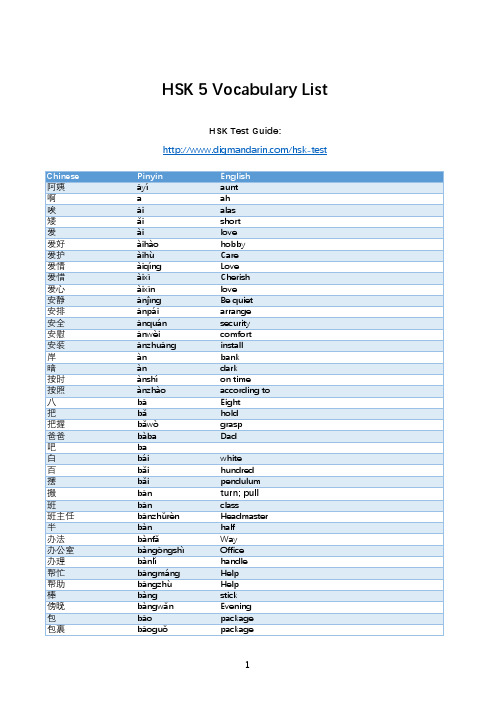
Contain Include Steamed stuffed bun thin full baby valuable keep Preservation protect Retain Insurance ensure Hold feel sorry report Presentation sign up Newspaper Pessimism glass north Beijing times Back background cover quilt book Undergraduate originally ability essence stupid nose than compare Proportion such as Match each other Notebook after all graduation avoid Inevitable Must essential necessary edit firecracker
4
吵架 车库 车厢 彻底 沉默 趁 衬衫 称 称呼 称赞 乘 乘坐 承担 承认 承受 程度 程序 成分 成功 成果 成绩 成就 成立 成熟 成为 成语 成长 诚恳 诚实 城市 吃 吃惊 吃亏 迟到 持续 池子 尺子 翅膀 冲 充电器 充分 充满 重复 重新 宠物
抽屉
抽象 抽烟 丑 臭 出
chǎojià chēkù chēxiāng chèdǐ chénmò chèn chènshān chēng chēnghu chēngzàn chéng chéngzuò chéngdān chéngrèn chéngshòu chéngdù chéngxù chéngfèn chénggōng chéngguǒ chéngjì chéngjiù chénglì chéngshú chéngwéi chéngyǔ chéngzhǎng chéngkěn chéngshí chéngshì chī chījīng chīkuī chídào chíxù chízi chǐzi chìbǎng chōng chōngdiànqì chōngfèn chōngmǎn chóngfù chóngxīn chǒngwù
2024届高考一轮复习英语课件(人教版)必修第三册:Space Exploration

28 high-end 29 foam 30 pillow 31 smartphone 32 closing
adj.高端的 n.泡沫橡胶;泡沫 n.枕头 n.智能手机 adj.结尾的;结束的 n.停业;关闭;倒闭
Ⅱ.记重点单词
1 launch 2 mankind 3 signal
4 recycle 5 muscle 6 float
adj.有决心的;意志坚定的 vt.查明;确定;决定
→determination n.决心;果断
5
disappointed
→disappoint
adj.失望的;沮丧的 vt.使失望
→disappointing adj.令人失望的
→disappointment n.失望;沮丧
6
desire
n.渴望;欲望 vt.渴望;期望
Unit 4 Space Exploration
基础知识排查 核心考点突破 写作能力提升
基础
知识排查
Ⅰ.认阅读单词
1 astronaut
2 procedure
3
cm
4 rocket
5 gravity
6 frontier
7 vehicle
速记——词汇句型背诵
n.宇航员;太空人 n.程序;步骤;手续 abbr.(centimetre or centimeter)厘米 n.火箭;火箭弹 n.重力;引力 n.边境;国界;边远地区 n.交通工具;车辆
vt.& n.发射;发起;上市 n.人类 vt.& vi.标志着;标明;发信号 n.信号;标志 vt.回收利用;再利用 n.肌肉;实力;影响力 vi.浮动;漂流;漂浮 vt.使浮动;使漂流
7 otherwise 8 beyond 9 current
Module6(课件)英语五年级上册
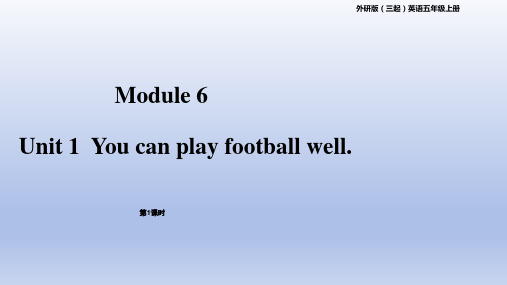
Homework
1. 跟读Activity 1至Activity 3的录音。 2. 用“can”写五个句子。
再见
外研版(三起)英语五年级上册
Module 6 Unit 2 He ran very fast.
第2课时
Look and say.
Warm-up
He can play football well.
一般过去时的结构:
He’s slow now, but healthy!
肯定句结构为:主语+动词的过去式+其它。
如: In the past, he ran very fast. 在过去,他跑的非常快。
否定句结构为:主语+did not (didn‘t)+动词原形+其它。
如: In the past, he didn’t run very fast. 在过去,他跑的不快。
我认为
Let’s learn.
Presentation
Amy: Hooray! Lingling, you’re a fantastic goalkeeper. I’m your first fan! Sam: You can play football well, Lingling. Lingling: Thank you.
外研版(三起)英语五年级上册
Module 6 Unit 1 You can play football well.
第1课时
Look and say.
Warm-up
Look, listen and say.
Presentation
Can he play basketball Oh, he can play it well!
英语人教PEP版九年级(上册)Unit+5般现在时的被动语态语法

构成
eg: Many people speak English. 动作的执行者 Eng有lis人h 称is s、po时ke态n和by数m的an变y 化people. 动作的承受者
be动词 + 及物动词的过去分词
句型 肯定句: 主语 + be +及物动词的过去分词+ (by…)
2.People play basketball all over the world. 3. We often see him help his classmates. 4. The trees cover the whole mountain. 5. The teachers take care of the children.
Active Voice: People grow tea in Hangzhou. Passive Voice: Tea is grown (by people) in Hangzhou.
语法重点:一般过去时的被动语态 (Passive Voice) 定义 当主语是动作的执行者时,谓语的形式为主动语态;
on weekends. ④When __a_r_e_ they _i_n_v_it_e_d__ (invite) to come here?
1. They are living in __G_e_r_m__a_n_y_ (German)now. 2. We can’t avoid_s_p_e_a_k_in_g(speak)of him. He needs our help. 3. Many people like cars __m__a_d_e_ (make) in Shanghai. 4. The company is known for its high-quality
How often do you exercise? Section A 1a-1c 课件
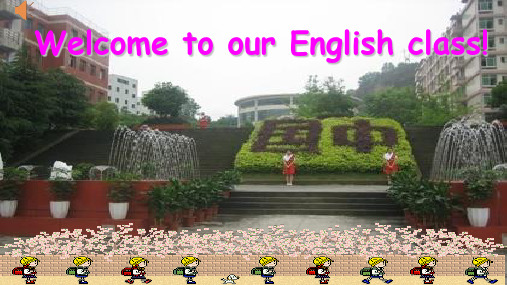
usually
______________
often sometimes hardly ever
_分__开__“__一__段_时__间__”(some time) 相分__聚开__“s_是_某_“_个_倍_时_;_候次_”_”((sosommeetimtiem)es) 相_聚__s_是__“__有__时__”__(sometimes)
I
often
I often go shopping on weekends.
seldom
sometimes
I sometimes exercise on weekends.
hardly ever
I seldom cook at home on weekends. I hardly ever play the guitar on weekends.
Welcome to our English class!
Unit 2 How often do you exercise? Section A 1a-1c
Did you enjoy your last weekend? What did we do last weekend?
read a book
twice a week 一周两次
I hardly ever go to the movies .
hardly ever “几乎不“
Do you always exercise?
No, I sometimes exercise. __H__o_w__o_f_t_e_n_____do you exercise?
do homework
watch TV
go shopping
read books
